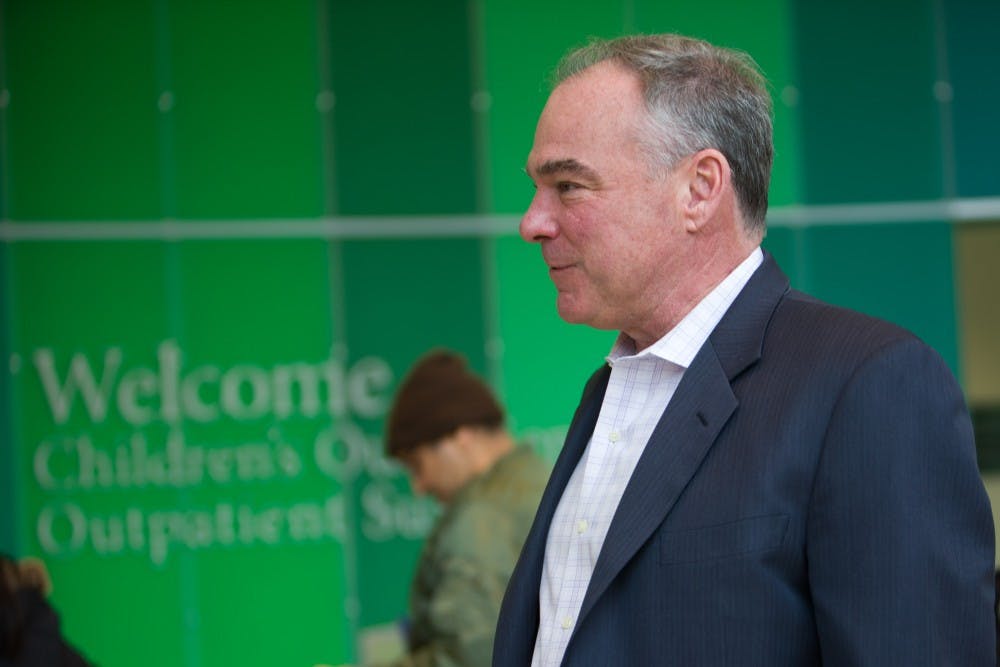Incumbent Sen. Tim Kaine (D-Va.) defeated Republican nominee Corey Stewart to retain control of one of Virginia’s two U.S. Senate seats in the 2018 midterm elections Tuesday. Kaine claimed victory in his first re-election bid with approximately 56 percent of the vote across the Commonwealth, beating out Stewart’s approximately 41 percent in Virginia after a nationally-prominent campaign.
“THANK YOU, VIRGINIA!” Kaine tweeted after exit polls indicated a clear victory. “In the Senate, I'll always listen to you. I'll take your ideas and values to Washington, and keep fighting to solve your problems. We have to keep Virginia moving forward and put our country back on the right track. That starts now!”
Stewart delivered his concession speech roughly two hours after some news outlets had declared Kaine the victor. Stewart acknowledged the difficulties facing his campaign in flipping the senate seat Republican but maintained his support for President Donald Trump and the trajectory of the administration.
“I don’t regret a thing because what we did, we gave it a good fight and we have a great president of the United States,” Stewart said. “[I just got] off the phone with Senator Kaine and I wish them God’s best and him and his family and he said ‘Look, you were walking into this, you knew it was a headwind’ and I said ‘I certainly did’ and it was a headwind and a little bit too much for us to overcome but there’s a lot of victories tonight, folks and it looks like we have a brand new Congressman in the Fifth District in Denver Riggleman.”
Kaine’s platform throughout the campaign generally followed most mainstream Democratic policy positions, emphasizing gun control, the protection of former President Barack Obama’s signature healthcare policy, the Affordable Care Act, and opposition to Trump’s immigration policies.
Kaine has had an extensive career in Virginia politics, beginning with his election to the Richmond City Council in 1994 where he served four terms, including two as mayor between 1998 and 2001. Kaine later served as lieutenant governor from 2002 to 2006, then won the governorship. He was succeeded in 2010 by Republican governor Bob McDonnell.
At the national level, Kaine’s national profile rose with his ascension to chairman of the Democratic National Committee from 2009 to 2011. Following his election to the Senate in 2012, in which Kaine defeated George Allen, a former Republican governor and congressman, the senator was nominated in 2016 to serve as the Democratic vice presidential candidate alongside running mate Hillary Clinton in a failed presidential bid that year.
The re-elected senator significantly outdid his challenger in terms of fundraising, with over $22 million raised throughout the campaign, according to the Virginia Public Access Project — more than Stewart’s $2.6 million. The majority of Kaine’s funding — around $12.7 million — was raised through individual contributions, with the remaining money coming from either transfers or political action committees and other committees.
Stewart raised a little over $2.6 million during this campaign cycle, according to numbers published by VPAP. Of this amount, nearly all, $2,606,790, was obtained via individual contributions, with an additional $22,249 received through donations from party committees, PACs and other contributors.
Prior to his Senate campaign, Stewart was elected as the chair at-large of Prince William County’s Board of County Supervisors, the county’s elected government. Stewart has held the post since taking office in 2007. The candidate also unsuccessfully campaigned for his party’s nomination as a candidate for lieutenant governor in the 2013 elections.
More recently, in December 2015, Stewart was tapped by now-President Trump to chair the latter’s Virginia campaign, a move that boosted the politician’s career to the national level as an outspoken supporter of the president’s policies both during and after his campaign. This nomination was followed in 2017 by an unsuccessful attempt for the Republican gubernatorial nomination, in which Stewart lost by a narrow margin to his opponent Ed Gillespie.
An advocate for Trump’s “America First” agenda, Stewart campaigned heavily on promises to bring back jobs to Virginia and create a less-restrictive environment for businesses operating in the state. The new senator’s platform also echoed mainstream Republican stances on illegal immigration, gun rights and abortion, in addition to other goals of lowering taxes, building a wall on the southern border with Mexico and repealing and replacing the Affordable Care Act.
Stewart has also been viewed as a controversial figure within the GOP, especially given his past statements that echo the views of white nationalists and other far-right factions. Stewart has made upholding the legacy of the Confederacy, including Confederate statues and monuments, a key focus of his past and present political campaigns. Additionally, a number of the candidate’s staff members have been shown to have ties to white supremacist individuals, with several white nationalists openly volunteering for Stewart’s campaign.
Kaine’s victory reinforces a solid Democratic hold in the Commonwealth in terms of its representation in the Senate. A Republican has not held either of the state’s U.S. Senate seats since 2009. Mark Warner, Virginia’s other senator, will not be up for reelection until 2020.
“Virginia showed who we are and who we aren’t,” Kaine said, according to The Washington Post, at his victory party in Falls Church.







